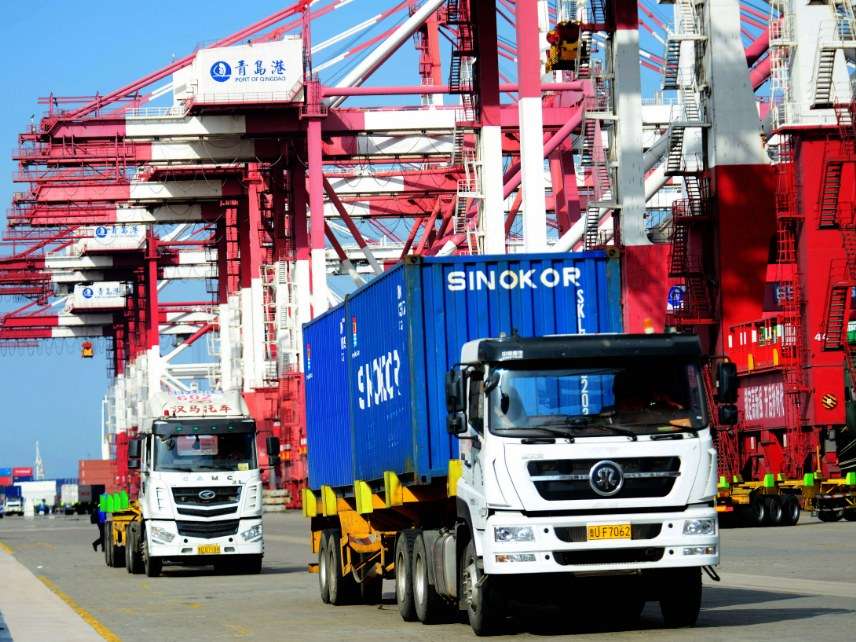We'll All Be Paying Trump's Hidden Tax
Tariffs hurt American consumers.

A while back Lawrence Summers, an economic adviser to the past two Democratic presidents, joked that President Trump's trade policies toward China and other nations amounted to: "Stop, or I'll shoot myself in the foot." Which is funny, but wrong. They actually amount to: "Stop, or I'll shoot the American public in the foot."
The tariffs Trump has imposed don't hurt foreign producers anywhere near as much as they hurt American consumers. After all: A tariff is simply a sales tax on imported goods. Guess who pays sales taxes?
Even worse, those taxes are often hidden. More than half of the imports to the U.S. are manufacturing components or raw materials, used by U.S. companies to make other products. So the 25 percent tariffs Trump has slapped on steel from China and a few other countries raise the cost of making things with steel in America.
Pennsylvania-based CP Industries, for instance, makes large cylinders to hold gases for the Navy and other customers. Earlier this month, it had to pay a $178,000 tariff for a shipment of steel tubes—"equivalent to about two weeks' payroll," The New York Times reported. At those rates Michael Larsen, the head of the company, wonders: "How long can we last?"
Hence the steel tariffs might protect some American jobs in the steel industry, but it will destroy others. That is the conclusion not only of free-market advocates such as the Cato Institute, but also fair-trade groups such as the Coalition for a Prosperous America. The Coalition concedes that while "the 19,000 jobs gained in the steel and aluminum sectors" would mostly offset job losses elsewhere (such as the 10,000 jobs destroyed in construction) the total effect would be a net job loss of more than 400.
That is the historical norm: For decades, protectionism has hurt the American consumer without much helping the American producer. The cost of each job saved by protectionist measures in the 1980s and 1990s, for instance, was almost $620,000 (in 2017 dollars).
The higher steel prices will inflict costs that often will not be seen directly. Here in Richmond, Virginia, the bill to erect a new state office building near the Capitol already has risen by $24 million, largely because politically imposed delays led to the use of more expensive construction materials. Higher steel prices will drive costs up further.
That single case won't make a big dent on the typical Virginia resident's tax bill, granted. But multiply the example by every newly built structure that uses steel girders, and the hidden economic effects soon pile up.
Meanwhile, the typical Virginia resident will pay higher prices for home appliances. In January, the administration imposed a 50 percent tariff on imported washing machines (and washing-machine parts) and a 30 percent tax on solar panels.
About 2,400 Americans work making washers and dryers in the U.S. According to one recent economic analysis, the net annual cost to consumers from the Trump tariffs comes to $1.4 billion—meaning Americans will spend $583,000 per year for every job saved.
That is, assuming the tariffs actually save jobs. They might do so in the washer industry, but they almost certainly will not save jobs overall. The $1.4 billion that would have been allocated to more productive uses will now go to meet the washing-machine tax. 'Twas a famous victory.
Another example that hits even closer to home: In response to a complaint by one paper plant owned by one hedge fund, the Trump administration has imposed steep tariffs on Canadian newsprint. The effect has been almost immediate. The Tampa Bay Times recently "announced that it would cut about 50 jobs after new tariffs imposed by the Trump administration dramatically increased the cost of newsprint," reported The Hill a few days ago. "A spokeswoman for the Times confirmed the layoffs … saying they are directly in response to the tariffs imposed on newsprint imported from Canada." More layoffs likely will follow elsewhere. In the meantime, other papers are reducing page counts, raising prices, or both.
All this damage is being inflicted even before other countries retaliate. If they do, a global recession could ensue. And even if it does not, it would hit Americans in unexpected times and places. Such as prom night.
A recent piece in The Wall Street Journal examined the work of economist Jay Zagorsky, who used government data to show that prom night is an increasingly good bargain. In the past 18 years the Consumer Price Index has risen 45 percent—but prom expenses have risen only 25 percent.
"What has kept prices down?" asks reporter Jo Craven McGinty. "The short answer is imports." Since the turn of the century prices for women's dresses and shoes have remained steady, and prices for men's suits have fallen by nearly one-fifth.
"A lot of these things have been subject to import pressure," Zagorsky says. "The African flower market is growing tremendously and is pushing down prices around the world. Asia has been producing shoes at cheaper and cheaper prices and at higher and higher quality."
All of which could go away if, say, China decides to follow through on its threat and fight fire with fire. If that happens, Americans will find themselves not only shot but burned as well.


Show Comments (28)